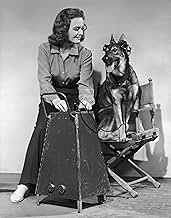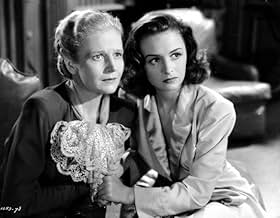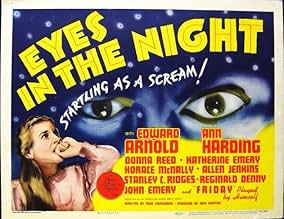PUNTUACIÓN EN IMDb
6,7/10
2,1 mil
TU PUNTUACIÓN
Añade un argumento en tu idiomaA blind detective and his seeing-eye dog investigate a murder and discover a Nazi plot.A blind detective and his seeing-eye dog investigate a murder and discover a Nazi plot.A blind detective and his seeing-eye dog investigate a murder and discover a Nazi plot.
- Dirección
- Guión
- Reparto principal
Stephen McNally
- Gabriel Hoffman
- (as Horace McNally)
Stanley Ridges
- Hansen
- (as Stanley C. Ridges)
Rosemary DeCamp
- Vera Hoffman
- (as Rosemary de Camp)
Steven Geray
- Anderson
- (as Steve Geray)
John Butler
- Taxicab Driver
- (sin acreditar)
Edward Kilroy
- Pilot
- (sin acreditar)
Reseñas destacadas
Although Edward Arnold did play some other good guys in his career, it's one that's normally associated with villainy. So he must have looked on with gratitude to MGM for allowing him to play Baynard Kendrick's fictional blind detective Duncan MacLain in two films of which Eyes In The Night is the first. My guess is that if Arnold were an MGM contract player the screen might have seen more of the resourceful Duncan MacLain.
Blindness as it has in a lot of people has forced Duncan MacLain to rely on those remaining senses and has honed his intelligence to a fine edge. He thinks pretty fast on his feet, especially after being hired by Ann Harding gains entrance to her household while she's away by convincing her servants that he's a long lost blind uncle. It's from there he finds out what's going on.
Harding hires Arnold because she's concerned that her step daughter Donna Reed is getting in way over her head with actor John Emery. When Emery turns up dead later that's an understatement.
But when Arnold gets into the household and sees what an interesting group of servants Harding and husband Reginald Denny have, he's thinking that romance might not just be at the bottom of this mystery.
Aided by filmdom's most remarkable dog since Rin Tin Tin in the canine of Friday, MacLain is also aided for strong arm stuff by his driver Allen Jenkins. Although as you will see in the film, Arnold when he gets in close is every bit up to the rough house aspect of the gumshoe profession.
The cast is excellent, especially butler Stanley Ridges who becomes Arnold's opposite number in terms of wit and intelligence. A worthy Moriarty type to Arnold's Holmes.
It's too bad that film never saw more of Duncan MacLain.
Blindness as it has in a lot of people has forced Duncan MacLain to rely on those remaining senses and has honed his intelligence to a fine edge. He thinks pretty fast on his feet, especially after being hired by Ann Harding gains entrance to her household while she's away by convincing her servants that he's a long lost blind uncle. It's from there he finds out what's going on.
Harding hires Arnold because she's concerned that her step daughter Donna Reed is getting in way over her head with actor John Emery. When Emery turns up dead later that's an understatement.
But when Arnold gets into the household and sees what an interesting group of servants Harding and husband Reginald Denny have, he's thinking that romance might not just be at the bottom of this mystery.
Aided by filmdom's most remarkable dog since Rin Tin Tin in the canine of Friday, MacLain is also aided for strong arm stuff by his driver Allen Jenkins. Although as you will see in the film, Arnold when he gets in close is every bit up to the rough house aspect of the gumshoe profession.
The cast is excellent, especially butler Stanley Ridges who becomes Arnold's opposite number in terms of wit and intelligence. A worthy Moriarty type to Arnold's Holmes.
It's too bad that film never saw more of Duncan MacLain.
Sure, it's pat and simplistic in places and the plot's a little daffy, but it has three major things going for it: an amazing dog named Friday, a delightful performance from veteran Edward Arnold and fine direction by Fred Zinnemann. It could've easily been filler, but Zinnemann has too much respect for his craft and the material to allow that to happen.
As others have pointed out, that dog really is something and nearly steals the show but Arnold is every bit as good. He is particularly amusing in his role within a role where he pretends to be an eccentric, ill-tempered uncle in order to foil the bad guys' dastardly scheme. (And that scheme is a big time McGuffin, no more than an obviously slight excuse to get all the conflicting characters under one roof.) Arnold's Cat & Mouse games with main villains Katherine Emery (resembling Mercedes McCambridge both in looks and delivery) and over-educated "butler" Stanley Ridges are tense and clever.
Zinnemann really shines in one ingenious scene set in a pitch dark basement. Arnold, playing a super smart blind sleuth growls "In the dark! In my kingdom now!" and proceeds to outwit a trigger happy thug. Not unlike the Coen brothers' "Blood Simple" 45 years later, the only light is provided by a number of randomly fired gunshots. Not surprisingly, this technique is effectively taut and unnerving. If you weren't aware who the director was at that point, it's the sort of thing that makes you go running to your film guide thinking "Whoa. Who directed this?"
As others have pointed out, that dog really is something and nearly steals the show but Arnold is every bit as good. He is particularly amusing in his role within a role where he pretends to be an eccentric, ill-tempered uncle in order to foil the bad guys' dastardly scheme. (And that scheme is a big time McGuffin, no more than an obviously slight excuse to get all the conflicting characters under one roof.) Arnold's Cat & Mouse games with main villains Katherine Emery (resembling Mercedes McCambridge both in looks and delivery) and over-educated "butler" Stanley Ridges are tense and clever.
Zinnemann really shines in one ingenious scene set in a pitch dark basement. Arnold, playing a super smart blind sleuth growls "In the dark! In my kingdom now!" and proceeds to outwit a trigger happy thug. Not unlike the Coen brothers' "Blood Simple" 45 years later, the only light is provided by a number of randomly fired gunshots. Not surprisingly, this technique is effectively taut and unnerving. If you weren't aware who the director was at that point, it's the sort of thing that makes you go running to your film guide thinking "Whoa. Who directed this?"
Edward Arnold plays a blind detective asked to look into the murder of an actor. Very quickly things become complicated as Arnold realizes that there are sinister forces at work that are not run of the mill.
This is a great thriller. I would love to say mystery, except that the mystery is solved about a third of the way through. Granted there are other details to work out, but the mystery is effectively over. Thats not to say you won't be sitting on the edge of your seat, you will. Arnold is an imposing figure and its a joy to watch this "helpless" man turn the tables on all of those around him. We in the audience know he's far from helpless, having witnessed the opening judo lesson, so we know whats in store for those who think they can get the upper hand on him.
The film isn't perfect. There are a few contrived bits and the end is rushed, still its 80 minutes well spent. The highest praise I can think of is if you're like me you'll probably wish there was more with this character. (Actually there is one more film, made three years later called the Hidden Eye, unfortunately that was it)
8 out of 10
This is a great thriller. I would love to say mystery, except that the mystery is solved about a third of the way through. Granted there are other details to work out, but the mystery is effectively over. Thats not to say you won't be sitting on the edge of your seat, you will. Arnold is an imposing figure and its a joy to watch this "helpless" man turn the tables on all of those around him. We in the audience know he's far from helpless, having witnessed the opening judo lesson, so we know whats in store for those who think they can get the upper hand on him.
The film isn't perfect. There are a few contrived bits and the end is rushed, still its 80 minutes well spent. The highest praise I can think of is if you're like me you'll probably wish there was more with this character. (Actually there is one more film, made three years later called the Hidden Eye, unfortunately that was it)
8 out of 10
What a gem of a movie! A blind detective, a Nazi plot and the smartest dog I've ever seen all make this a very enjoyable mystery/thriller. Young Donna Reed really is stunning and Mr. Arnold nails it as the blind detective. Great acting all the way around and some plot twists keep you watching. Enjoy it.
Edward Arnold plays blind detective Duncan Maclain in "Eyes in the Night," a 1942 MGM film directed by Fred Zinnemann that has a lot of other familiar faces.
Ann Harding made her return to the screen after a few years in this small film, playing the stepmother, Norma Lawry, of a young actress, Barbara (Donna Reed at 21), who's fallen in love with an older actor with whom Harding was once involved.
Norma wants Mac to help her convince the actor it's best to steer clear of Barbara. Norma's husband is in Washington presenting a formula to the government that is critical to the war effort.
Unfortunately, the actor turns up dead, and Barbara sees not only his dead body, but her stepmother, when she arrives at the man's apartment. Norma goes running to Mac for help. He sets out to find the killer, and it leads him into a web of espionage.
Nice job by Zinnemann, who was just starting out, though he didn't like doing the film except for working with Ann Harding and Donna Reed. As others have mentioned, his pitch black gun battle with the only light coming from the fired shots is most effective and portends the great things to come from him. Overall, it's an okay story, well done.
Edward Arnold does an excellent job (though Zinnemann said he kept blowing his lines) as the smart and likable blind detective, who is aided by an assistant (Allen Jenkins) and his dog Friday, who looks to be a German shepherd mix.
Friday is unbelievable - what an actor and athlete! That dog had some training. Zimmemann didn't agree. Friday, who was descended from a silent dog star named Flash, apparently was only good for one take, becoming bored easily. In fact, Friday's only film appearances are in the two Duncan Maclain films.
Besides Reed, one can spot Rosemary DeCamp as Vera the maid, Stanley Ridges as the butler, Stephen McNally as Vera's husband Gabriel, Mantan Moreland as Mac's butler, and I honestly thought Katherine Emery WAS Mercedes MacCambridge. Wow! Even the speaking voice.
This was intended as a series for MGM, but the studio only made one other. Universal took the fat man detective series from the radio and made a film with J. Scott Smart with an early appearance by Rock Hudson directed by William Castle, but never followed it up. Nevertheless, there's something about these fat detectives, going back to Nero Wolfe, I guess, that's appealing.
Enjoyable. Glad Friday was able to keep his date after all.
Ann Harding made her return to the screen after a few years in this small film, playing the stepmother, Norma Lawry, of a young actress, Barbara (Donna Reed at 21), who's fallen in love with an older actor with whom Harding was once involved.
Norma wants Mac to help her convince the actor it's best to steer clear of Barbara. Norma's husband is in Washington presenting a formula to the government that is critical to the war effort.
Unfortunately, the actor turns up dead, and Barbara sees not only his dead body, but her stepmother, when she arrives at the man's apartment. Norma goes running to Mac for help. He sets out to find the killer, and it leads him into a web of espionage.
Nice job by Zinnemann, who was just starting out, though he didn't like doing the film except for working with Ann Harding and Donna Reed. As others have mentioned, his pitch black gun battle with the only light coming from the fired shots is most effective and portends the great things to come from him. Overall, it's an okay story, well done.
Edward Arnold does an excellent job (though Zinnemann said he kept blowing his lines) as the smart and likable blind detective, who is aided by an assistant (Allen Jenkins) and his dog Friday, who looks to be a German shepherd mix.
Friday is unbelievable - what an actor and athlete! That dog had some training. Zimmemann didn't agree. Friday, who was descended from a silent dog star named Flash, apparently was only good for one take, becoming bored easily. In fact, Friday's only film appearances are in the two Duncan Maclain films.
Besides Reed, one can spot Rosemary DeCamp as Vera the maid, Stanley Ridges as the butler, Stephen McNally as Vera's husband Gabriel, Mantan Moreland as Mac's butler, and I honestly thought Katherine Emery WAS Mercedes MacCambridge. Wow! Even the speaking voice.
This was intended as a series for MGM, but the studio only made one other. Universal took the fat man detective series from the radio and made a film with J. Scott Smart with an early appearance by Rock Hudson directed by William Castle, but never followed it up. Nevertheless, there's something about these fat detectives, going back to Nero Wolfe, I guess, that's appealing.
Enjoyable. Glad Friday was able to keep his date after all.
¿Sabías que...?
- CuriosidadesThe first film in what was meant to be to be a mystery franchise focused on blind detective Duncan Maclain who solved murders with the help of his seeing eye dog, Friday. When the second entry, The Hidden Eye (1945), failed to elicit sufficient interest, MGM ended the series.
- PifiasWhen the butler/enemy agent Hansen confronts Duncan MacLean loudly playing the organ in the middle of the night, Hansen ruffles his own hair to appear as if he has been sleeping and just awakened - clearly forgetting that MacLean cannot see his appearance.
- Créditos adicionalesFriday appears as himself.
- Versiones alternativasThere is now a colorized version available. Highly recommended as much of the film is set in the dark which doesn't register well in the b&w original.
- ConexionesFeatured in Personalities (1942)
Selecciones populares
Inicia sesión para calificar y añadir a tu lista para recibir recomendaciones personalizadas
- How long is Eyes in the Night?Con tecnología de Alexa
Detalles
Taquilla
- Presupuesto
- 433.000 US$ (estimación)
- Duración1 hora 20 minutos
- Color
- Relación de aspecto
- 1.37 : 1
Contribuir a esta página
Sugerir un cambio o añadir el contenido que falta
































